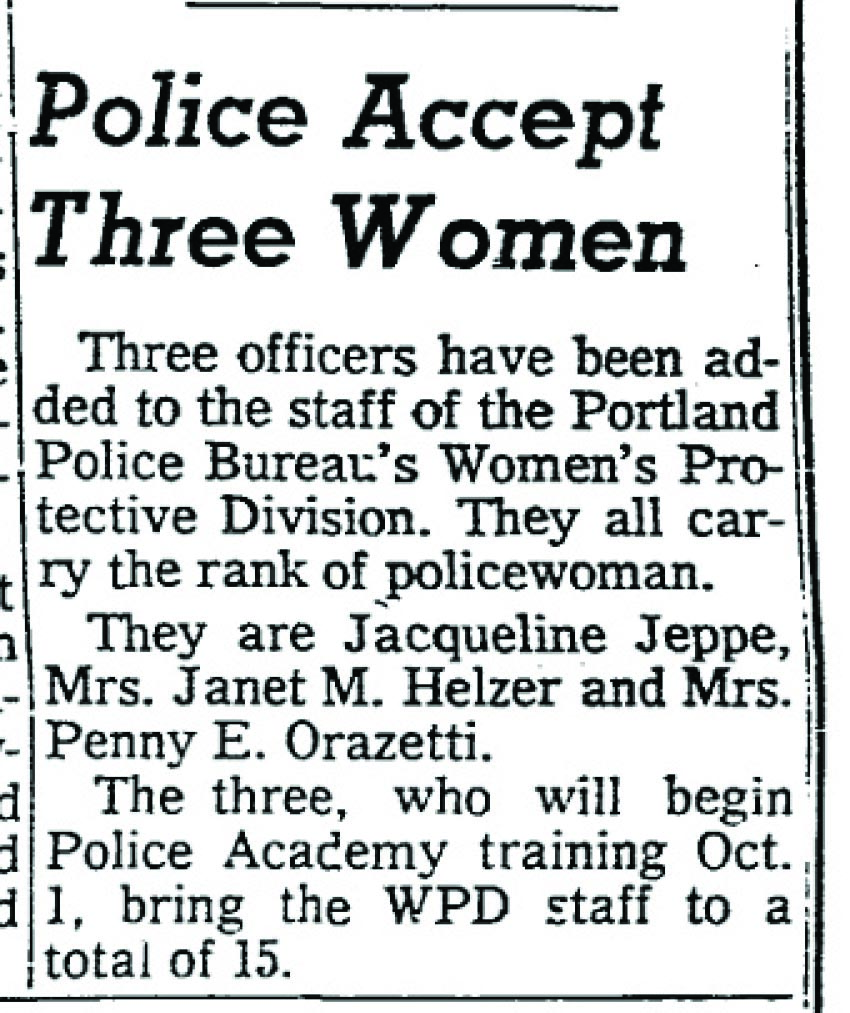On January 24, 1985, Penny Ledyard Orazetti Harrington was sworn in as Portland Police Chief, the first woman in the United States to lead a major police department. Since joining the force in 1964, she had made it her mission to remove the obstacles that had prevented women, in Portland and elsewhere, from having a career in policing. Harrington’s tenure in Portland created opportunities for women to assume leadership positions in the Portland Police Bureau and helped open the field of policing to women in the United States.
Penny Eileen Ledyard was born in Lansing, Michigan, on March 2, 1942, the oldest of four children. Her mother, Mary Ledyard, was a homemaker; her father, Leonard Ledyard, was superintendent in a steel plant. During a high school career day, Ledyard shadowed a police woman in the Lansing Police Department, an encounter that inspired her to study police administration at Michigan State University.
After graduating in 1964, Penny and her husband Richard Orazetti moved to Portland, where she joined the Portland Police Bureau’s Women’s Protective Division. Like all other police women since the Division’s inception in 1908, she was limited to investigating matters relating to women and children (the first fulltime paid policewoman in the United States, Lola Greene Baldwin, led the Portland WPD from 1908 to 1922). By 1968, Harrington (then Orazetti) had begun to question her narrow role and applied for a position in another division. When she was told she did not qualify because she was a woman, she took her case to Mayor Terry Schrunk, who overruled the bureau’s decision. In 1970, she became the first policewoman with an assignment outside the Women’s Protective Division. Penny's sister, Roberta Ledyard, joined the force in 1971. By 1970, the Orazettis had divorced (they had one son); Penny married Gary Harrington in the early 1980s.
While Harrington consistently sought opportunities for advancement, she encountered obstacles in the Police Bureau that prevented women from holding leadership positions. Relying on the labor discrimination provisions in the 1964 Civil Rights Act, she worked to remove those barriers by filing more than forty civil rights complaints against the City of Portland, the State of Oregon, and the federal government. By 1972, she was the Bureau’s first woman detective and sergeant. She became the first woman lieutenant in 1977, the first woman captain in 1980, and the first woman chief in 1985. MS. magazine named Harrington Woman of the Year in 1985. A year later, Harvard Law School included her on its list of the ten most influential women in law.
Harrington was an early proponent of community policing, which represented a fundamental rethinking of how policing was done. Traditional police professionals, who had acted as the experts and sole decision makers, were now asked to consult with citizen partners in the development of law enforcement policies. As commander of Portland’s East Precinct in 1980, Harrington began asking citizens for input. The response was positive, and within two years, over the strenuous objections of the police union and the Police Bureau leadership, Portland voters approved the Police Internal Investigations Auditing Committee, one of the nation’s first civilian review boards. Its members were authorized to review the police handling of citizen complaints and recommend changes in Bureau policies. Community policing was formally adopted with a 1989 city council resolution declaring community policing as Portland’s overarching approach to law enforcement.
Harrington’s professional life was not without controversy. She was branded a “rabble-rouser” and worse by the police union and traditionalists who actively opposed many of the changes she introduced during her tenure. Her legacy includes equalizing the pay gap and changing the term “patrolman” to “police officer.” She was chief when Tony Stevenson, a Black man, was killed by a white officer who assumed Stevenson was a thief and put him into a deadly sleeper hold. Harrington banned the maneuver, and in response, two officers sold t-shirts with the words “Don’t Choke ‘Em, Smoke ‘Em” next to an image of a smoking gun. Mayor Bud Clark fired the officers, on Harrington’s recommendation, but they were reinstated. Tension between Harrington and the union led to accusations of misconduct, and after seventeen months and much local turmoil, Clark removed her as chief.
Her national reputation, however, did not suffer. Harrington gave television interviews, participated in panel discussions, testified before national committees, and consulted with police departments. In 1988, she was hired by the California State Bar as an assistant director of investigations—a position she held until 1995 when she co-founded the National Center for Women and Policing. As director of that institution, Harrington led the push to increase the number of women in policing nationwide. In 2018, she accepted an invitation from the U.S. Department of Justice to give a presentation on the progress made by women in policing and the obstacles they face. Due in part to Harrington’s efforts, the percentage of women officers in Portland has grown from 7 percent in 1980 to 16 percent in 2019 (the national average remains below 13 percent). Since Harrington’s departure from the Portland Police Bureau, three women have held the position of Police Chief.
In 2010, Harrington (by then divorced) retired and opened a shop in Morro Bay, California, where she lived until her death on September 15, 2021.
-
![]()
Penny Harrington, 1985. Police Chief- January 24-1985 - June 2, 1986. Portland Police Bureau photo.
Courtesy Portland Police Museum & Historical Society.
-
![]()
Penny Harrington in her office in 1985.
Courtesy Don Ryan, Associated Press.
-
![]()
Triumph of Spirit: An Autobiography by Chief Penny Harrington, book cover, 1999.
Courtesy Brittany Publications Ltd.
-
![]()
"Police Accept Three Women," Oregonian, September 7, 1964.
Courtesy Portland Oregonian
-
![]()
"Mayor names Harrington police chief," Oregonian, January 25, 1985.
Courtesy Portland Oregonian
Related Entries
Map This on the Oregon History WayFinder
The Oregon History Wayfinder is an interactive map that identifies significant places, people, and events in Oregon history.
Further Reading
Harrington, Penny. Triumph of Spirit. Chicago, Ill.: Brittany Publications, 1999.
Kooi, Brandon. Seven Highly Effective Police Leaders: 1895–Modern Times. New York: Taylor and Francis, 2021.
Seelye, K. Q. “Penny Harrington, Who Broke a Blue Ceiling, Dies at 79.” New York Times. October 5, 2021.
Serbulo, Leanne C., and Karen Gibson. "Black and Blue: Police Community Relations in Portland's Albina District, 1964-1985." Oregon Historical Quarterly 114.1 (Spring 2013): 6-37.






